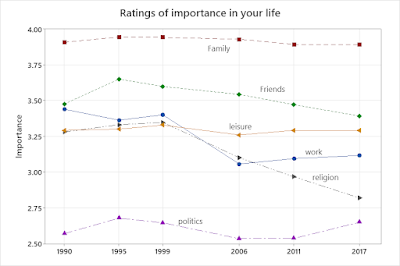This is a follow-up to my post arguing that American political institutions, which were traditionally held to reduce polarization (and probably did), promote it given the conditions that prevail today (viz., parties that are distinguished by ideology). A new book by Steven Levitsky and Daniel Ziblatt that makes the same general argument has been getting attention, so I thought I should say how my view differs from theirs. Levitsky and Ziblatt say that the main problem is institutions that work against majority rule, like the Senate, the Electoral College, and gerrymandered congressional districts. As Michelle Goldberg summarizes it "The Constitution’s countermajoritarian provisions, combined with profound geographic polarization, have locked us into a crisis of minority rule." However, in recent years the institutions that are more majoritarian have been more of a problem. For example, most of the Republican members of the House of Representatives voted against "certifying" the 2020 election, but only a few of the Republican members of the Senate did. It's the House, not the Senate, that has tried to use the debt ceiling as a political weapon. Judges, including judges appointed by Trump, almost unanimously rejected Trump's attempts to overturn the results of the 2020 election. Since the election, Republican-controlled state legislatures have made efforts to change electoral rules to benefit Republicans. I think that the difference between the Senate and the House and state legislatures arises because Senators have a higher profile--someone who goes against the party may be able to survive, and even to benefit. But Representatives and members of the state legislature are unknown to many of their constituents. So the logic of trying to appeal to the "median voter" doesn't hold for them--the median voter probably won't even know what they've done, and will treat them like any other Democrat or Republican. But party activists will know, and may support a primary challenge or withhold financial support.
I also want to elaborate on my point about the complexity of the American political system, especially the electoral system. That provides opportunities to take advantage of the system--figuring out some angle you can use to get your way. Of course, if you do that, the other party is likely to retaliate, and the possibility of retaliation can be an effective deterrent. But the complexity of the system also means that there's room for disagreement about whether an action is out of bounds, or how severe an infraction it is. So the other side commits some offense, you retaliate in what you regard as a reasonable and proportionate manner, and then they are indignant about what they regard as a grossly excessive reaction. It's even possible to take offense at things that haven't happened, but that you think might happen. For example, a Washington Post column by Jason Willick discussing the argument that Trump is ineligible to run for president: "What is sure to be a well-funded and well-coordinated campaign to disqualify Trump from office has begun.... Champions of 'automatic' disqualification have one pragmatic objective in mind: Eliminating Trump from U.S. politics. So what if they turn the 14th Amendment’s Section 3 into a Red Scare instrument in the process? ... populists will someday have another chance in government. At that point, liberals might come to regret having legitimated the 14th Amendment as a quasi-authoritarian tool for purging political opposition." During the 2020 election campaign, the Claremont Review talked about how Democrats would try to overturn a Trump victory. And if the hypothetical action you became indignant about doesn't happen, you don't have to conclude that you were wrong--you can conclude that they surely would have done it if we hadn't called them out.
And finally, some data. In 2016, a CNN/ORC poll asked people if they thought Trump would concede if he lost the election and then asked the same question about Hillary Clinton. About 65% said that Trump would not concede, and 25% said Clinton would not. Answers were strongly related to who you favored--Trump supporters were more likely to say that he would concede and less likely to say that Clinton would, and Clinton supporters were more likely to say that she would concede and Trump wouldn't. But that wasn't the only thing that made a difference: more educated people were more likely to say that both would concede. The percent expecting each to concede, by candidate preference and education:
Not college grad Trump Clinton
Trump supporter 52% 57%
Clinton supporter 19% 92%
Neither/DK 22% 63%
College grad Trump Clinton
Trump supporter 67% 70%
Clinton supporter 26% 95%
Neither/DK 30% 77%
Similar questions were asked in 2020, with similar overall results, although I can't get the breakdowns. The point is that some Trump supporters could justify his refusal to concede by a belief that the Democrat wouldn't have conceded either.
[Data from the Roper Center for Public Opinion Research]

